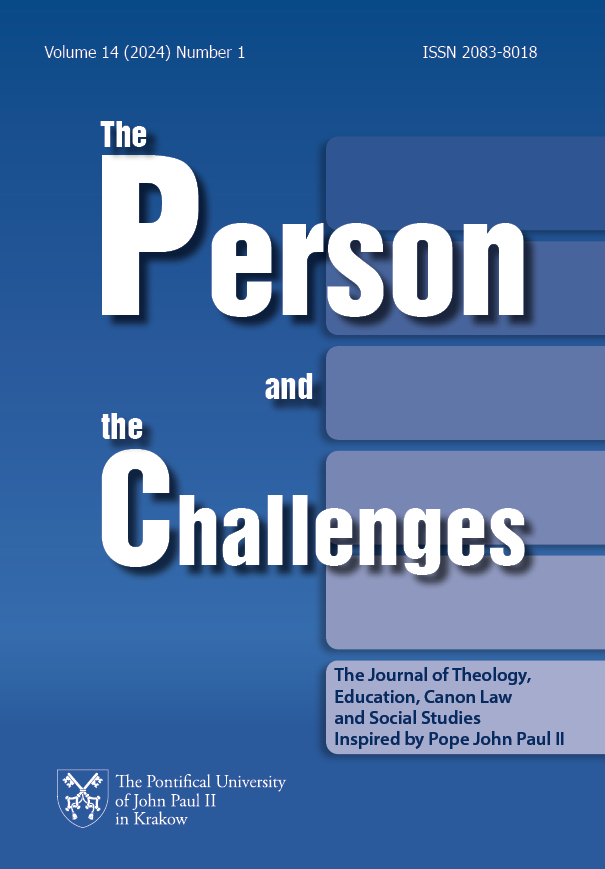A Duty to Remain Connected: a Biblical Perspective of the Wisdom of the Shabbàt
DOI:
https://doi.org/10.15633/pch.14110Słowa kluczowe:
Shabbàt, work, rest, common home, creationAbstrakt
Our labour is intricately woven into our identity, extending beyond mere livelihood. It ought to facilitate personal growth, define our societal roles, and contribute to a common good within the confines of social and environmental sustainability. However, the contemporary work landscape is undergoing profound and global changes, disrupting traditional and conventional notions of work dynamics and its associated relationships. Amidst the diverse and country-specific alterations, a universal paradigm shift is reshaping nearly every sector of the economy. The pressing question emerges: How can we prevent the shift toward more flexible employment from translating into a life of perpetual instability? As job structures become more malleable and the boundaries between professional and personal life blur, the risks of self-exploitation and work-induced stress loom. In navigating these transformations, we must discern the evolving paradigms of work and consider their social and economic repercussions. What lessons are we being prompted to internalize as the European work landscape undergoes unprecedented changes? It becomes imperative to explore these shifts and their implications for a sustainable and equitable future. Exploring the existential insights of the Shabbàt and extracting valuable lessons from biblical wisdom prompts us to ponder the significance of rest in fostering healthy relationships and connectivity—with ourselves, others, our work, and our shared environment. The prevalent culture of constant availability and the obligation to stay connected could benefit from a biblical perspective, particularly in grasping the essence of Shabbàts wisdom.
Bibliografia
Burer M.H., Jesus, Sabbath Actions, and Divine Sabbath Work, in: Divine Sabbath Work, Pennsylvania 2012, Pennsylvania State University Press, pp. 103–135.
Byrne B., Romans, Sacra Pagina Series 6, Collegeville, MN, 1995, Michael Glazier – Liturgical Press.
Dohmen Ch., Stenmans P., Weinfeld M., כָּבֵד [kābḕd] – כָּבוׄד [kābôd], in: G.J. Botterweck, H. Ringgren, H.J. Fabry (eds.), Theological Dictionary of the Old Testament, vol. 7, Grand Rapids, MI 1995, Eerdmans, pp. 13–38.
Droge A.J., Sabbath Work/Sabbath Rest: Genesis, Thomas, John, “History of Religions” 47 (2007) 2/3, pp. 112–141.
Dunn J.D.G., Ethics in Practice, in: The Theology of Paul the Apostle, London – New York, 1998, T&T Clark, pp. 670–712.
Garrad L., A Paradigm Shift in Work Culture: Are We Ready for the Consequences of Remote Work?. In: https://www.linkedin.com/pulse/re-thinking-employee-experience-remote-workers-part-1-lewis-garrad (23 January 2024).
Gundry R.H., Matthew. A Commentary on His Handbook for a Mixed Church under Persecution, second edition, Grand Rapids, MI, 1994, Eerdmans.
Heschel A.J, The Sabbath: Its Meaning for Modern Man, New York 1951, Farrar, Straus, Giroux.
Kittel G., δοκέω [dokéō] et al, in: G. Kittel (ed.), G.W. Bromiley (trans.), Theological Dictionary of the New Testament, vol. 2, Grand Rapids, MI 1964, Eerdmans, pp. 232–255.
Lamberty-Zielinski H., “נְשָׁמָה [neshāmāh],” in: G.J. Botterweck, H. Ringgren, H.J. Fabry (eds.), Theological Dictionary of the Old Testament, vol. 10, Grand Rapids, MI, 1999, Eerdmans, pp. 65–70.
MacDonald M.Y., Colossians and Ephesians, Sacra Pagina Series 17, Collegeville, MN, 2000, Michael Glazier – Liturgical Press.
Martin T.W., Sabbath, in: R.L. Brawley (ed.), The Oxford Encyclopedia of the Bible and Ethics, vol. 2, Oxford 2014, Oxford University Press, pp. 233–237.
Matera F.J., Galatians, Sacra Pagina Series 9, Collegeville, MN, 1992. Michael Glazier – Liturgical Press.
Neusner J. (ed.), Sabbath, in: Dictionary of Judaism in the Biblical Period (450 B.C.E. to 600 C.E., Peabody, MA 1996, Hendrickson, pp. 538–539.
Westerholm S., Craig A. Evans, Sabbath, in: C.A. Evans, S.E. Porter (eds.), Dictionary of New Testament Background, Downers Grove, IL, 2000, InterVarsity, pp. 1031–1035.
Pobrania
Opublikowane
Numer
Dział
Licencja
Prawa autorskie (c) 2024 Paul Sciberras

Utwór dostępny jest na licencji Creative Commons Uznanie autorstwa 4.0 Międzynarodowe.
Autorzy publikujący w czasopiśmie udzielają jego wydawcy zgody o następującej treści:
- Autor zachowuje autorskie prawa majątkowe do utworu, a jednocześnie udziela wydawcy czasopisma zgody na jego pierwszą publikację w wersji drukowanej i wersji online na licencji Creative Commons Uznanie autorstwa 4.0 Międzynarodowe oraz zgody na wykonywanie opracowań, w tym przekładów.
- Autor ma możliwość udzielania zgody niewyłącznej na opublikowanie utworu w wersji, która ukazała się w czasopiśmie (np. zamieszczenia go w repozytorium instytucjonalnym lub opublikowania w książce), wraz z informacją o jego pierwszej publikacji w czasopiśmie.
- Autor może umieścić swój utwór online (np. w repozytorium instytucjonalnym lub na swojej stronie internetowej) jeszcze przed zgłoszeniem utworu do czasopisma.

